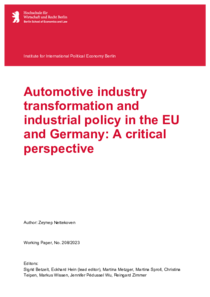Automotive industry transformation and industrial policy in the EU and Germany: a critical perspective

Institute for International Political Economy Berlin
HWR - Berlin
2023
26 p.
automobile industry ; decarbonization ; digitalisation ; competitiveness ; environment ; sustainable development
Working Paper
208/2023
Industrial economics
English
Bibliogr.
"The automotive industry in the European Union (EU) and Germany faces major challenges including decarbonisation, digitalisation and global competition. While the automotive industry has a significant economic role in terms of income and employment, it has immense ecological damages. The green and digital transition make certain occupations redundant, causing job losses, while it generates new occupations in new economic activities. These put the industry in the center of socio-ecological transformation debate in Germany and the EU. The vertical industrial policy with a focus on energy and technology-intensive areas has become important in the EU and Germany due to these challenges. The industrial policy in the EU and Germany follows an ecological modernisation approach with a “sustainable competitiveness” motto, whereby electromobility transformation is perceived as the ultimate route on the way to decarbonisation, digitalisation and global competitiveness. Alternative approaches see this differently. The democratic conversion approach and the degrowth approach, while having differences, both perceive electromobility as only one part of a comprehensive mobility system transformation needed; they view a decline in private automobility and a more democratic transformation with labour and environmental stakeholders as essential in the face of climate crisis"
Digital
The ETUI is co-funded by the European Union. Views and opinions expressed are however those of the author(s) only and do not necessarily reflect those of the European Union or the ETUI.